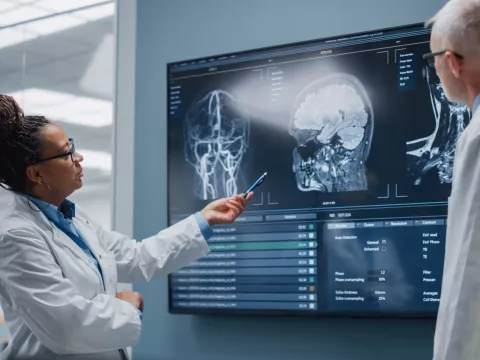
Trusted Care to Embrace Healing
We know how different arteriovenous malformation (AVM) can be for every patient. That’s why we specialize in helping people with brain AVMs at all stages and ages, so they can find hope and healing.
Whether you need ongoing monitoring or you’re a candidate for a minimally invasive AVM procedure, our AVM program has the team, the technology and the compassion to help you manage your condition and focus on the life you love.
What to Know About Arteriovenous Malformation
- What Is AVM?
-
Normally, your arteries carry oxygen-rich blood from the heart to the brain, while your veins carry blood with less oxygen away from the brain and back to the heart.
An AVM brain condition is a malformed tangle of arteries and veins in the brain that usually happens during prenatal development. It bypasses normal tissue and diverts blood from the arteries directly to the veins. There are also dural arteriovenous malformations (DAVM), which occur in the dura mater, the thick and tough covering of the brain.
Brain AVMs are more common in men, and the risk of developing AVMs may be genetic. They are also extremely rare: less than 1% of the general population experiences them. And though they’re present at birth, they might not be found until later in life.
Many people with AVMs never experience problems. But over time, these tumors will grow and change along with a person’s body. These tumors may eventually cause symptoms, which can be concerning since AVM brain symptoms can be serious, like hemorrhage or uncontrolled bleeding. - Arteriovenous Malformation Symptoms
-
While AVM symptoms can vary depending on the location of the AVM, common physical AVM symptoms can include:
- Backache
- Bleeding
- Buzzing sound in the ears
- Changes in the sense of smell
- Changes in vision
- Dizziness
- Drooping eyelids
- Facial paralysis
- Headache
- Loss of consciousness
- Loss of sensation
- Muscle weakness
- Pain
- Problems speaking
- Problems with motion
- Seizures
Many people only discover they have an AVM when it bleeds, and this can cause a stroke. So, if you suspect you might have an AVM, even if your symptoms aren’t obvious, contact your doctor right away.
If you’re experiencing severe AVM symptoms such as numbness, a seizure, vomiting or physical weakness, call 911 immediately.
Left untreated, AVMs with severe symptoms can enlarge and then rupture, causing subarachnoid hemorrhage and intracerebral hemorrhage, leading to permanent brain damage.
- Arteriovenous Malformation Diagnosis
-
The two most common ways to detect AVMs are through magnetic resonance imaging (MRI) or computed tomography (CT) brain scans. Sometimes, a doctor will use an angiogram to identify what type of AVM a patient has. Repeated testing can help monitor changes in an AVM’s size, as well as to detect new lesions or bleeding.
- Arteriovenous Malformation Treatment
-
How to treat AVMs depends on the size, location and type of lesion. Before our team designs a treatment plan, we assess factors like:
- The size of the tumor
- Whether the tumor has bled
- Whether the tumor is growing
- Whether the tumor is in an area of the brain that’s difficult to treat
Once the AVM is assessed, our team can offer the full spectrum of treatment options for AVMs, which includes:
Neurointerventional Radiology or Endovascular Neurosurgery
Sometimes, a catheter can be placed inside the blood vessels to block the abnormal vessels with materials like coils or glue. This can help treat either part or all of an AVM.
Medical Therapy
If the AVM is in a part of the brain that can’t be easily treated, or if there are no serious symptoms, you may be able to manage your AVM by avoiding excessive exercise and blood thinners.
Stereotactic Radiosurgery
We can encourage an AVM to clot by focusing a concentrated, high-energy source on the AVM to create a scar. Stereotactic radiosurgery is recommended for smaller AVMs that are in harder-to-reach areas using regular surgery.
Traditional Surgery
Your doctor may recommend surgery if the AVM is in an area of the brain that can be easily accessed, or if it has bled.

Hearts and Minds Dedicated to You
When you’re living with an AVM medical condition, having someone at your side to coordinate every aspect of your health care can help strengthen your body, mind and spirit. At the AdventHealth Brain and Spine Institute, you’ll have a care team to guide you at every step, from your initial AVM screening to your personalized treatment plan and into recovery.

